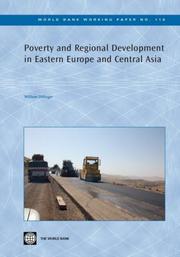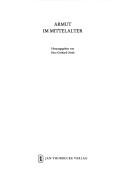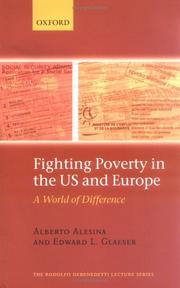| Listing 1 - 10 of 12 | << page >> |
Sort by
|
Multi
ISBN: 9781447341284 9781447341214 9781447341321 9781447341291 9781447341307 9781447341314 1447341287 1447341295 1447341317 1447341333 Year: 2019 Publisher: Bristol Policy Press
Abstract | Keywords | Export | Availability | Bookmark
 Loading...
Loading...Choose an application
- Reference Manager
- EndNote
- RefWorks (Direct export to RefWorks)
This book investigates different policy and civic responses to extreme poverty, ranging from food donations to penalisation and 'social cleansing' of highly visible poor and how it is related to concerns of ethics, justice and human dignity.
Armoede --- Europa --- beleid --- 364.22 --- Poverty --- Poor --- Government policy --- Services for --- #SBIB:316.8H15 --- Welzijns- en sociale problemen: sociale ongelijkheid en armoede --- Social problems --- Europe --- Poverty - Europe --- Poverty - Government policy - Europe --- Poor - Services for - Europe
Book
ISBN: 1003000975 1000198898 1000198936 9781003000976 9781000198935 9781000198911 100019891X 9781000198898 9780367430528 0367430525 Year: 2021 Publisher: Abingdon, Oxon ; New York, NY : Routledge,
Abstract | Keywords | Export | Availability | Bookmark
 Loading...
Loading...Choose an application
- Reference Manager
- EndNote
- RefWorks (Direct export to RefWorks)
"This book explores the variety of energy poverty in post-communist Europe and shows how it is viewed and addressed through public policies. At a time when the European Union is developing strategies to achieve its energy transition, many citizens in the Eastern part of Europe are still struggling to have access to affordable and clean energy sources and live in highly energy-inefficient homes. While energy poverty is severely affecting parts of the region's population, only few comparative analyses have been developed so far to understand the phenomenon and its diversity throughout the region. This book aims to fill this gap by focusing on a set of countries that have undergone significant transitions over the past three decades, while still facing major challenges regarding the provision of clean and affordable energy to their citizens and the renovation of their housing stock. The chapters of this book explore the specificities of these countries by looking at the magnitude of energy poverty and at its drivers in every situation. They show how energy poverty is being viewed by policymakers and discuss critically the instruments implemented to help the energy poor. This book will be of great interest to researchers in the fields of energy policy and comparative politics, to policymakers in post-communist countries and EU institutions, and also to other relevant actors, such as companies and NGOs who focus on issues of energy poverty"--
Energy security --- Energy dependence --- Energy independence --- Energy insecurity --- Security, Energy --- Energy policy --- Energy consumption --- Poverty --- Post-communism --- Social aspects --- Energy security - Europe, Eastern --- Energy consumption - Social aspects - Europe, Eastern --- Energy policy - Europe, Eastern --- Poverty - Europe, Eastern --- Post-communism - Europe, Eastern

ISBN: 0821371614 9780821371619 9780821371626 0821371622 9786610940370 1280940379 Year: 2007 Volume: 118 Publisher: Washington, D.C. : World Bank,
Abstract | Keywords | Export | Availability | Bookmark
 Loading...
Loading...Choose an application
- Reference Manager
- EndNote
- RefWorks (Direct export to RefWorks)
Regional economic development is an interest of policymakers throughout the Europe and Central Asia (ECA) region. One of its principal aims is to reduce poverty in lagging regions by stimulating local economic growth. However, problems exist with this approach. First, it may miss the target. Although geographical concentrations of poverty exist, poor people also live in regions that are-on average-rich. Second, the sources of the problem may be misdiagnosed. Poverty is not only related to where people are, but to who people are. In ECA, poverty is associated with low levels of education and pe
Poverty --- Pauvreté --- Europe, Eastern --- Asia, Central --- Europe de l'Est --- Asie centrale --- Economic policy --- Politique économique --- Poverty. --- Business & Economics --- Economic History --- Destitution --- Wealth --- Basic needs --- Begging --- Poor --- Subsistence economy --- Poverty - Europe, Eastern --- Poverty - Asia, Central --- Pauvreté - Europe de l'Est --- Pauvreté - Asie centrale --- Europe, Eastern - Economic policy - 1989 --- -Asia, Central - Economic policy - 1991 --- -Europe de l'Est - Politique économique - 1989 --- -Asie centrale - Politique économique - 1991 --- -Poverty --- -Poverty - Europe, Eastern
Multi
ISSN: 17271347 ISBN: 9289023694 9789289023696 Year: 2003 Volume: 1 Publisher: Copenhague : OMS, Bureau régional de l'Europe,
Abstract | Keywords | Export | Availability | Bookmark
 Loading...
Loading...Choose an application
- Reference Manager
- EndNote
- RefWorks (Direct export to RefWorks)
Armoede --- Community health --- Destitution --- Health services --- Hygiene [Social ] --- Pauvreté --- Poverty --- Public health --- Public health services --- Public hygiene --- Santé publique --- Social hygiene --- Volksgezondheid --- Poor --- Pauvres --- Health aspects --- Medical care --- Aspect sanitaire --- Soins médicaux --- Delivery of Health Care --- National Health Programs --- Socioeconomic Factors --- Armoede/Maatschappelijke ongelijkheden --- Pauvreté/Inégalités sociales --- Pauvreté --- Soins médicaux --- Case studies --- National Health Service (Great Britain) --- Organization and administration --- Health aspects. --- Poverty - Europe --- Delivery of Health Care - Europe --- National Health Programs - Europe --- Socioeconomic Factors - Europe

ISBN: 3799566589 9783799566582 Year: 2004 Volume: 58 Publisher: Sigmaringen Thorbecke
Abstract | Keywords | Export | Availability | Bookmark
 Loading...
Loading...Choose an application
- Reference Manager
- EndNote
- RefWorks (Direct export to RefWorks)
Poverty --- Poor --- History --- 943.02 --- Geschiedenis van Duitsland: verdrag van Verdun tot de Reformatie--(843-1519) --- 943.02 Geschiedenis van Duitsland: verdrag van Verdun tot de Reformatie--(843-1519) --- Destitution --- Wealth --- Basic needs --- Begging --- Subsistence economy --- Disadvantaged, Economically --- Economically disadvantaged --- Impoverished people --- Low-income people --- Pauperism --- Poor, The --- Poor people --- Persons --- Social classes --- Economic conditions --- Europe --- To 1500 --- Congresses --- Poverty - Europe - History - To 1500 - Congresses --- Poor - Europe - History - Congresses

ISBN: 0521557968 0521462509 0511559399 9780521557962 9780521462501 9780511559396 Year: 1995 Publisher: Cambridge Cambridge University press
Abstract | Keywords | Export | Availability | Bookmark
 Loading...
Loading...Choose an application
- Reference Manager
- EndNote
- RefWorks (Direct export to RefWorks)
The Welfare State is a key policy issue of the 1990s. The essays in this book depart from much of the recent economic debate in emphasising the positive contributions of the Welfare State, and in assessing its efficiency in relation to the objectives which it is intended to achieve. These objectives are not just the alleviation of poverty but more broadly the provision of security and the redistribution of income. Part A of the book sets the current debate in the context of the current evidence about income inequality and poverty in Europe. Part B analyses the existing role of the Welfare State, with particular reference to retirement pensions and unemployment benefit. Part C investigates proposals for reform and security. What is the case for greater targeting? How can we design a social safety net? What is the future of European social protection policy?
Gross national product --- Social security --- Public welfare --- Income distribution --- Poverty --- 339.220941 --- #SBIB:316.8H15 --- #SBIB:316.8H40 --- #SBIB:HIVA --- 313 --- 336.024 --- 339.21 --- 339.325.1 --- 368.40 --- GB / United Kingdom - Verenigd Koninkrijk - Royaume Uni --- 330.56 --- 330.56 Nationaal inkomen. Volksinkomen. Gezinsinkomen. Vermogensstratificatie. Particuliere inkomens en bestedingen. Armoede. Honger --- Nationaal inkomen. Volksinkomen. Gezinsinkomen. Vermogensstratificatie. Particuliere inkomens en bestedingen. Armoede. Honger --- Destitution --- Wealth --- Basic needs --- Begging --- Poor --- Subsistence economy --- Distribution of income --- Income inequality --- Inequality of income --- Distribution (Economic theory) --- Disposable income --- Welzijns- en sociale problemen: sociale ongelijkheid en armoede --- Sociaal beleid: social policy, sociale zekerheid, verzorgingsstaat --- Levenswijze en levensstandaard. Levensminimum. sociale indicatoren (Studiën) --- Sociale begroting, rekeningen en uitgaven. Gezondheid --- Ongelijkheid en herverdeling van vermogens en inkomens. Inkomensbeleid --- Evolutie van de consumptie. Budget van de huishoudens --- Sociale voorzorg en verzekeringen. Sociale zekerheid: algemeenheden --- Great Britain --- Europe --- Income distribution - Great Britain. --- Poverty - Europe. --- Public welfare - Europe. --- Income distribution. --- Business, Economy and Management --- Economics --- Social security - Europe --- Public welfare - Great Britain --- Public welfare - Europe --- Income distribution - Great Britain --- Social security - Great Britain --- Poverty - Great Britain --- Poverty - Europe --- Income distribution - Europe
Book
ISBN: 9782070785773 2070785777 Year: 2008 Publisher: Paris Gallimard
Abstract | Keywords | Export | Availability | Bookmark
 Loading...
Loading...Choose an application
- Reference Manager
- EndNote
- RefWorks (Direct export to RefWorks)
L'air du temps chez les économistes, les sociologues, voire les historiens, est à réflexion: existe-t-il une alternative à cette forme nouvelle d'ensauvagement qu'est devenu le libéralisme économique. pour lequel tout peut désormais s'échanger, ycompris la vie, comme des biens ordinaires? Réponse la plus courante: le retour à l'économie du don et le développement du microcrédit, observé dans les pays du tiers monde. Aidant les êtres à se désengluer de la misère plutôt qu'à faire fructifier l'argent sur le marché de la spéculation financière, le microcrédit est au aujourd'hui paré des atours d'une économie morale parce que solidaire. Ces deux formes d'activité économique ont déjà existé dans l'Europe moderne. L'économie, fondée sur la confiance et le crédit, est alors encastrée dans des enjeux sociaux qui la dépassent. Loin de consolider un cloisonnement, le crédit et sa toile embrassent toutes les hiérarchies - groupes sociaux, institutions et régions dans des dépendances où chacun - les hommes et les femmes selon des modalités spécifiques - se trouve être à la fois préteur et endetté. Se tissent ainsi des réseaux d'obligations en cascade, donc de pouvoir, dans les espaces géographiques sociaux les plus variés. La relation de confiance entre créanciers et débiteurs, prêteurs et emprunteurs, constitue un lieu social fondamental. Deux cultures économiques - la féodale et la capitaliste - se côtoient, chacune portée par des valeurs spécifiques, s'affrontent, mais également s'influencent au point de se transformer. Restituer le champ des expériences possibles ou communes rend, du même geste, les multiples tensions qui traversent les sociétés: au niveau collectif, entre des sociétés d'ordre et de statut et le développement parallèle de rationalités économiques; au niveau individuel, entre les exigences contradictoires
History of Europe --- anno 500-1499 --- anno 1500-1799 --- Sociology --- Social ethics --- Utilitarianism --- Poverty --- Sociologie --- Morale sociale --- Utilitarisme --- Pauvreté --- Economic aspects --- History --- Aspect économique --- Histoire --- Europe --- Economic conditions --- Conditions économiques --- Histoire économique et sociale --- --Crédit --- --Temps modernes, --- --Credit --- Loans --- AA / International- internationaal --- 331.162.0 --- 174 --- Geschiedenis van de particuliere financiën: algemeenheden. --- Verband tussen de ethiek en de economie. Ethiek en bedrijf. --- Credit --- History. --- Pauvreté --- Aspect économique --- Conditions économiques --- Destitution --- Wealth --- Basic needs --- Begging --- Poor --- Subsistence economy --- Borrowing --- Lending --- Loans for consumption --- Finance --- Investments --- Money --- Verband tussen de ethiek en de economie. Ethiek en bedrijf --- Geschiedenis van de particuliere financiën: algemeenheden --- Crédit --- Temps modernes, 1492-1789 --- Credit - Europe - History --- Loans - Europe - History --- Poverty - Europe - History --- Sociologie économique --- Libéralisme économique --- Circulation monétaire --- Crises économiques --- Microfinance --- Aspect moral --- 1492-1800

ISBN: 1840643757 1843763400 9781840643756 Year: 2002 Publisher: Cheltenham Elgar
Abstract | Keywords | Export | Availability | Bookmark
 Loading...
Loading...Choose an application
- Reference Manager
- EndNote
- RefWorks (Direct export to RefWorks)
Marginality, Social --- Poverty --- Public welfare --- People with social disabilities --- Handicapés sociaux --- Marginalité --- -People with social disabilities --- -330.56 <4> --- Culturally deprived people --- Culturally disadvantaged people --- Disadvantaged people, Culturally --- Disadvantaged people, Socially --- People with cultural disabilities --- Socially disadvantaged people --- Underprivileged people --- Nationaal inkomen. Volksinkomen. Gezinsinkomen. Vermogensstratificatie. Particuliere inkomens en bestedingen. Armoede. Honger--Europa --- 330.56 <4> Nationaal inkomen. Volksinkomen. Gezinsinkomen. Vermogensstratificatie. Particuliere inkomens en bestedingen. Armoede. Honger--Europa --- Handicapés sociaux --- Marginalité --- #SBIB:316.8H15 --- #SBIB:316.8H40 --- #SBIB:35H437 --- 330.56 <4> --- Socially handicapped --- People with disabilities --- Destitution --- Wealth --- Basic needs --- Begging --- Poor --- Subsistence economy --- Welzijns- en sociale problemen: sociale ongelijkheid en armoede --- Sociaal beleid: social policy, sociale zekerheid, verzorgingsstaat --- Beleidssectoren: sociale zekerheid --- Europe --- Economic policy. --- Social policy. --- Social stratification --- Social policy --- Social problems --- Aide sociale --- Pauvreté --- Politique sociale --- Politique économique --- Marginality, Social - Europe. --- Poverty - Europe. --- Public welfare - Europe. --- People with social disabilities - Europe.

ISBN: 9780199286102 9780199267668 0199267669 0199286108 9786610755059 0191533149 1429421843 1280755059 Year: 2004 Publisher: Oxford Oxford university press
Abstract | Keywords | Export | Availability | Bookmark
 Loading...
Loading...Choose an application
- Reference Manager
- EndNote
- RefWorks (Direct export to RefWorks)
In this this timely study of the different approaches of America and Europe to the problems of domestic inequality and poverty, the authors describe just how different the two continents are in the level of State engagement in the redistribution of income. They discuss various possible economic and sociological explanations for the difference, including different attitudes to the poor, notions of social responsibility, and attitudes to race. - ;As events highlight deep divisions in attitudes between America and Europe, this is a very timely study of different approaches to the problems of dome
Social policy --- Income --- United States --- Europe --- -362.57094 --- -#A0511PSA --- Poverty --- 362.57094 --- 330.580 --- 336.024 --- 368.40 --- AA / International- internationaal --- EEC / European Union - EU -Europese Unie - Union Européenne - UE --- US / United States of America - USA - Verenigde Staten - Etats Unis --- 330.56 --- 330.56 Nationaal inkomen. Volksinkomen. Gezinsinkomen. Vermogensstratificatie. Particuliere inkomens en bestedingen. Armoede. Honger --- Nationaal inkomen. Volksinkomen. Gezinsinkomen. Vermogensstratificatie. Particuliere inkomens en bestedingen. Armoede. Honger --- Destitution --- Wealth --- Basic needs --- Begging --- Poor --- Subsistence economy --- Government policy --- Gecontroleerde economie. Geleide economie. Welvaarststaat. Algemeenheden --- Sociale begroting, rekeningen en uitgaven. Gezondheid --- Sociale voorzorg en verzekeringen. Sociale zekerheid: algemeenheden --- #A0511PSA --- Pauvreté --- Politique gouvernementale --- Pobresa --- Política governamental --- Europa --- Estats Units d'Amèrica --- Poverty - Europe --- Poverty - United States --- Poverty - Government policy - Europe --- Poverty - Government policy - United States --- United States of America
Book
ISBN: 9781847427250 1847427251 9781847427281 1847427286 9781847427267 184742726X 9781847427274 1847427278 1447305558 128332136X 9786613321367 1447303873 1283321351 9786613321350 Year: 2011 Publisher: Bristol Policy
Abstract | Keywords | Export | Availability | Bookmark
 Loading...
Loading...Choose an application
- Reference Manager
- EndNote
- RefWorks (Direct export to RefWorks)
This book provides a systematic comparative and longitudinal analysis of minimum income protection systems in seventeen EU-countries based on a newly developed dataset.
Public welfare --- Social policy --- Europe --- Solidarity --- -Group identity --- -337.142 --- #SBIB:327.7H231 --- #SBIB:316.8H00 --- Collective identity --- Community identity --- Cultural identity --- Social identity --- Identity (Psychology) --- Social psychology --- Collective memory --- Cooperation --- Europese Unie: sociaal-economisch beleid, landbouw-, milieu-, cultuur- en communicatiebeleid --- Sociaal beleid: algemeen --- Council of Europe countries --- Eastern Hemisphere --- Eurasia --- Economic integration --- -Social aspects. --- Europe -- Economic integration -- Social aspects. --- Group identity -- Europe. --- Solidarity -- Europe. --- Business & Economics --- Sociology & Social History --- Social Sciences --- Economic Theory --- Social Conditions --- Gender & Ethnic Studies --- Ethnic & Race Studies --- Social aspects. --- Income maintenance programs -- Europe. --- Poverty -- Europe. --- Public welfare -- Europe. --- Social security -- Europe. --- Politics and government. --- Minimum wage --- Politics --- Minimum wages --- Wages --- Living wage movement --- -Europe --- Guaranteed annual income --- Economic policy
| Listing 1 - 10 of 12 | << page >> |
Sort by
|

 Search
Search Feedback
Feedback About UniCat
About UniCat  Help
Help News
News